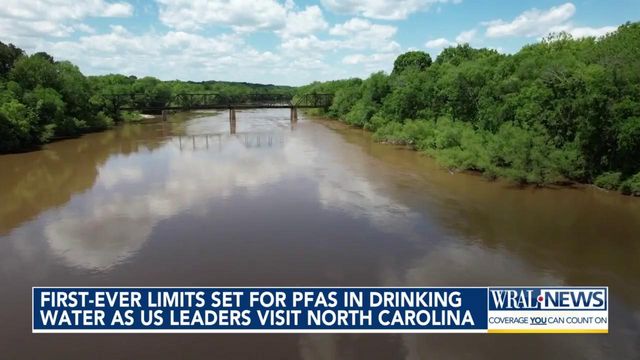New rules aim to make drinking water safer in North Carolina by removing toxic chemicals
State and federal officials met Wednesday in Fayetteville to announce the first-ever national limits on forever chemicals in drinking water.
A new rule issued by the Environmental Protection Agency requires more than 200 chemical plants nationwide to reduce toxic emissions that could cause cancer.
The rule aims to make drinking water safer by reducing exposure for 100 million Americans, which officials said can prevent cancer and thousands of illnesses.
Forever chemicals are a class of compounds known as per- and polyfluoroalkyl substances (PFAS) that resist heat, water and oil. Studies have linked PFAS exposure to serious health risks, including certain cancers, liver and heart damage in adults, and harmful immune and developmental effects on infants and children.
"It's in the blood of every American at this point just about 99%, including babies while they're in the womb," said Ken Cook, president and co-founder of the Environmental Working Group.
Katie Bryant, a mother of two from Pittsboro, said she’s been fighting for regulations after she found out her children had been exposed.
"That is terrifying, these things probably won't leave them in their lifetime," Bryant said.
PFAS are the same chemicals found linked to the local Chemours plant, which contaminated the drinking water of more than 100,000 people in Fayetteville, Wilmington and surrounding areas.
"We learned that for decades, Chemours had been dumping forever chemicals into our precious Cape Fear River, saturating our souls and spewing emissions into the air from miles and miles," said Michael Regan, the current EPA administrator, who is from North Carolina. "Today I'm proud to return to North Carolina to announce the first-ever nationwide legally enforceable drinking water standard for PFAS."
Regan joined other White House officials Wednesday morning at an event in Fayetteville to announce the new standards for drinking water.
Fayetteville has long grappled with PFAS in drinking water. In 2017, researchers discovered PFAS contamination in the Cape Fear River drinking water supply, including forever chemicals uniquely linked to the Chemours Fayetteville Works plant, formerly owned by DuPont.
“North Carolina, like so many states, has seen the impact of industrial pollution on water supplies,” said Ali Zaidi, National Climate Policy Advisor to President Biden. “We know these forever chemicals can cause cancer and other severe illnesses, and there are over 100 million people across the country with some form of exposure.”
The Safe Drinking Water Act standard for PFAS marks the first federal regulation for new contaminants in 28 years. The rule announced Tuesday will set limits for five individual forever chemicals, including PFOA and PFOS, as well as a limit for any combination of four PFAS. Public water systems will be required to monitor and reduce PFAS levels to meet limits and notify the public of any violations.
Many advocates said it’s a long overdue protection, while utility groups and others worry about the costs of compliance.
At the Fayetteville Public Works Commission facility, officials said it will cost an estimated $80 million to $100 million to install a GAC filter, which removes certain chemicals from water.
The Biden administration announced an additional $1 billion to help states fund infrastructure upgrades to comply with the new rules, but it's likely that some of the cost will be passed on to water customers.
"It doesn't care what your politics are, it doesn't care where you live, it doesn't care about money in your pocket," Regan said. "When it comes to basic needs of clean drinking water, no matter what your political party is, whether you live in the South or the Midwest, everyone should be able to turn on their tap and trust that the water they are drinking and giving their children is safe."
Customers of Cape Fear Public Utility Authority, which serves the City of Wilmington and unincorporated New Hanover County, saw water bill increases after the utility installed granular activated carbon filters for $43 million, with $5 million in yearly operational costs. Some utility groups have spoken out against PFAS drinking water standards, citing the high cost of implementing treatment systems.
You can find full coverage of PFAS in North Carolina on WRAL.com
The Association of Metropolitan Water Agencies said in a statement, in part: “EPA’s cost analysis vastly underestimates the real-world costs that this rulemaking will impose on public water systems, and ratepayers will bear those costs. Even worse, those costs will disproportionately affect economically disadvantaged and underserved communities.”
Research shows those chemicals have been linked to liver damage and developmental problems in children. At least 45% of the nation’s tap water is estimated to have those chemicals, known as PFAS. That’s according to a federal study last year.
An additional $12 billion in funding from the Bipartisan Infrastructure Law supports general drinking water investments, including PFAS treatment. Officials say 40% of the overall benefits of these federal funds will be earmarked for disadvantaged communities.
North Carolina will receive $29 million in grant funding to help utilities implement testing and upgrade water treatment technology to meet the new standards.
“The first national drinking water standards for PFAS marks a significant step towards delivering on the Biden-Harris Administration’s commitment to advancing environmental justice, protecting communities, and securing clean water for people across the country,” said Brenda Mallory, Chair of the White House Council on Environmental Quality.
How safe is your drinking water?
WRAL found forever chemicals in drinking water in Raleigh, Cary and Durham, with the highest levels in Cumberland County and Burlington. A filter can help eliminate chemicals.












